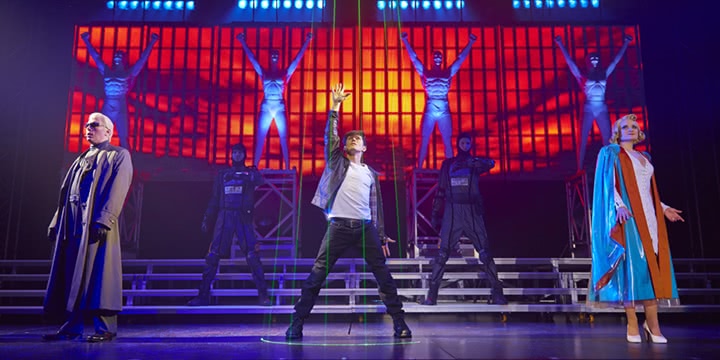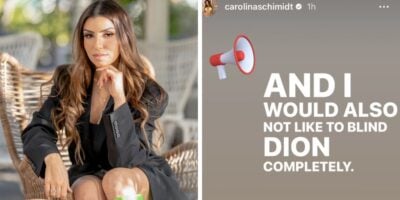Ben Elton’s career has been so varied that it’s hard to predict just how people are most familiar with him.
His groundbreaking television work on The Young Ones and Blackadder is one facet, but then there are his achievements in musical theatre, including Love Never Dies and the phenomenally successful Queen musical We Will Rock You – not to mention his 15 novels and film and radio work. Meeting the dual Brit/Aussie on the eve of the We Will Rock You Sydney season provides a comprehensive look at his winding career.
Elton’s first novel, Stark, was released in 1989 – a comedic bestseller about environmental collapse that was largely set in Australia. “It’s getting close!” he laughs. “Obviously I didn’t know about global warming then, because in those days it was the ozone layer we were all worried about. I was particularly concerned with the physical pollution. I had this idea that there’d just be so much dirt that it wouldn’t be possible to clean the world, and certainly these rubbish islands that are floating around the seas now, these great slicks of plastic bags – I think it’s horrifying. The only reason I would ever regret having children is, well, that doubles your despair because you can’t even think, ‘Well, at least I’ll be dead when the end comes.’ That’s an awful way to put it, and I can scarcely bear to talk about our consumption of the world’s resources, and we’re all a part of it. We’re all culpable.”
The world of Stark is grim, and as we turn our focus to the rest of Elton’s canon – the doomed anarchy of The Young Ones, the Orwellian undertones of We Will Rock You – you’d be forgiven for thinking he’s a depressed man. Instead, he is animated and engaging, and quick to assure that if there are indeed thematic links between his work, it is not by design.
“My manager has always said, ‘Why don’t you write a character like James Bond or Harry Potter, something where you can build an audience? Every book you write is completely different!’ I mean, the three eco novels – Stark, Gridlock and This Other Eden – were still pretty different. Since then, they’ve really been different. There doesn’t seem to be a lot of connection, but sometimes the ideas might touch. I guess dystopian visions is something I’ve done a bit. This Other Eden was definitely that, and We Will Rock You. It’s not an environmentally concerned one, but it is a prediction for the increasing digitisation and corporatisation of entertainment. It was written at the end of the last century, when there were no iPhones, there was no streaming, no American Idol. But all that was in the script in 1999 when I did the first treatment. It made it quite difficult, because it’s all come true so quickly, I’ve had to change it!
“There’s nothing very interesting in observing a kid locked onto a little device that takes their attention and deprives them of a social life, because I’ve got three kids and that’s just normal now. So I guess there are recurrent themes in my work, but I do tend to reinvent myself. The Young Ones was a bit like The Black Adder, and The Thin Blue Line was a bit like The Young Ones. But sometimes when I do [something different], people feel betrayed.”
We Will Rock You first opened in London in 2002, and has since been seen by tens of millions. While the legacy of Queen can hardly be disputed, there is a strong argument to be made for the musical sustaining their contemporary presence, and introducing many people to the remarkable versatility of the band. Queen’s catalogue is so comprehensive – so vibrant and inspiring – that the process of finding songs to anchor Elton’s story was fairly direct.
“The story came from the vibe of Queen rather than any specific song,” he says. “In fact, one of the reasons that the most complex and intriguing of all Queen songs, ‘Bohemian Rhapsody’, is not in the story but nailed on at the end, is because the songs didn’t directly inspire the story. Queen and the vibe and the legend, their obsession with live music, that’s what informed it. They’re all storytelling songs. ‘Somebody To Love’ can be a love song, or it can be a song of self-loathing. ‘Each morning I get up I die a little / Can barely stand on my feet’. Some people hear it as looking for somebody to love, but I hear it as needing to learn how to love yourself. Or that’s how I used it. Brian [May], Roger [Taylor] and I talked a lot about it. But everyone has their own meaning to songs. [Bob Dylan’s] ‘Subterranean Homesick Blues’, who knows what that means?
“So I was able to use the songs that I wished, really, but most of them fell entirely into place. Mainly I used hits, which wasn’t hard since it’s Queen; they have something like 40 chart hits! But there’s one song I used that Freddie [Mercury] never heard, called ‘No-One But You’, that Brian wrote for Freddie after his death. It’s a beautiful song that wasn’t really known, but we made it into a hit. From this album track scarcely known, to 20 million people hearing it as a tribute to everyone who dies young. To those whose promise is unfulfilled. We use it not just for Freddie, but for anyone who has those feelings in their heart.”
We Will Rock You runs from Thursday April 28 at Sydney Lyric Theatre.


































